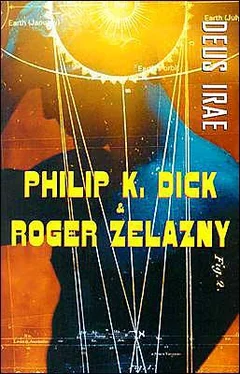Blinking in surprise, Tibor gaped, then protested, “But my metabattery! Suppose it gives out!”
Father Handy said, “So you do blame your tools.” His voice was carefully controlled, quietly resounding.
At the stove, Ely said, “Fire him.”
To her, Father Handy said, “I fire no one. A pun. Fire: their hell, the Christians. We don’t have that,” he reminded her. And then to Tibor he said the Great Verse of all the worlds, that which both men understood and yet did not grasp, could not, like Papagano with his net, entangle. He spoke it aloud as a bond holding them together in what they, the Christians, called agape, love. But this was higher than that; this was love and man and beautifulness, the three: a new trinity.
Ich sih die liehte heide
in gruner varwe stan.
Dar suln wir alle gehen,
die sumerzit enphahen.
After he said that, Tibor nodded, picked up his coffee cup once more, that difficult, elaborate motion and problem; sipped. The room became still and even Ely, the woman, did not chatter.
Outdoors, the cow which pulled Tiber’s cart groaned huskily, shifted; perhaps, Father Handy thought, it is looking for, hoping for, food. It needs food for the body, we for our mind. Or everyone dies. We must have the mural; he must travel over a thousand miles, and ifhis cow dies or his battery gives out, then we expire with him; he is not alone in this death.
He wondered if Tibor knew that. If it would help to know. Probably not. So he did not say it; in this world nothing helped.
Neither man knew who had written the old poem, the medieval German words which could not be found in their Cassell’s dictionary; they together, the two of them, had imagined out, summoned, found, the meaning of the words; they were certain they were right and understood. But not exactly. And Ely sneered.
But it was, I see the light-stricken thicket. In green—and then they did not quite know. It somehow stood in greenness. And we will all go there… was it soon? The summertime to—but to what? To reach? To find? Or was it—the summertime to leave?
They felt it, he and Tibor; a final truth, and yet it was, for them in their ignorance, without reference sources, both leaving and finding the summertime, the sun-struck woodland; it was life and the leaving of life fused, since they did not quite make it out rationally, and it frightened them, and yet they turned and returned to it, because—and perhaps exactly because they could not understand—it was a balm; it salved them.
Now, Father Handy and Tibor needed a power—mekkis, Father Handy thought to himself—to come from Above and aid them… on this, the Servants of Wrath agreed with the Christians: the good power lay Above, Ubrem Sternenzelt, as Schiller had once said: above the band of stars. Yes, beyond the stars; this they were clear on; this was modern German.
But it was strange, depending on a poem whose meaning one did not actually grasp; he wondered, as he unfolded and searched through the old stained gas-station maps once given out free in prewar days, if this was not a stigma of degeneracy. An omen of badness… not just that times were bad but that they themselves had become bad; the quality was lodged withinthem.
His conference now was with the Dominus McComas, his superior in the hierarchy of the Servants of Wrath; the Dominus sat, large and tepid, with strangely cruel teeth, as if he tore things, not necessarily living, in fact much harder—as if he did a job, a profession, teethwise.
“Carl Lufteufel,” the Dominus McComas said, “was a son of a bitch. As a man.” He added that because of course one did not speak of the god part of the god-man, the Deus Irae, like that. “And,” he said, “I’ll give you ten to five that he made martinis with sweet vermouth.”
“Did you ever drink sweet vermouth straight or with ice?” Father Handy asked.
“It’s sweet piss,” McComas grated in his horrid, low voice, and, as he spoke, cut into his spongy gum with the tail of a wooden match. “I am not kidding; it’s nothing but horse piss they’ve bought.”
“Diabetic horses,” Father Handy said.
“Yeah, passing sugar.” McComas grunted a ha-ha; his round, red—red as if they had short-circuited and the metal in them had heated up, dangerous and improper—eyes sparked; but this was normal, as was his half-zipped fly. “So your inc,” McComas grated, “is going to roll all the way to Los Angeles. Is it downhill?” And this time he laughed so that he spat onto the table. Ely, seated off in a corner, knitting, stared at him with such flat hate that Father Handy felt uncomfortable and turned his attention to the creased gas-station maps.
“Carleton Lufteufel,” Father Handy said, “was Chairman of the Energy Research and Development Administration from 1982 to the beginning of the war.” He spoke half to himself. “To the use of the gob.” The great objectless bomb, a bomb which detonated not at one particular spot on the Earth’s surface but which acted so as to contaminate a layer of the atmosphere itself. It therefore (and this was the sort of weapons-theorizing that had gone on prior to World War Three) could not be headed off, as a missile could be by an antimissile, or a manned bomber, no matter how fast—and they had gone quite fast, by 1982—by, incredibly, a biplane. A slow biplane.
In 1978 the biplane had reappeared in the D-III. Defensive III, a flap-flap man-made pelican which held within it a limitless fuel supply; it could circle, at low altitude, for months, while, within, the pilot lived off his suit as Our Grandparents had lived off trees and shrubs. The D-III biplane had a tropic device which directed its efforts when a manned bomber, even at fantastic altitude, came; the D-III began to ascend when the bomber was still a thousand miles away, releasing from between its wings a sinkerlike weight of vast density which pulled the plane to the proper altitude; the D-III and its pilot were actually jerked high, where no atmosphere to speak of existed. And the sinker—it had actually been called that even though it did just the opposite; it in fact lifted—carried the biplane and the man within toward the manned bomber, and all at once the two objects met. And everyone died. But “everyone” was only three men in all: two in the bomber, one in the D-III. And, below, a city lived on, lit up, composedly functioning. .While other D-IIIs circled, circled, month after month; like certain raptors, they hovered for a seeming eternity.
However, it was not truly eternity. The antimissiles and the D-IIIs had kept off the fatal wasps for a finite time, and then at last the Dies Irae had come—for everyone, because of the gob, the great objectless device which Carleton Lufteufel had detonated from a satellite at an apogee of five thousand miles. It had been imagined that the U.S. would in some mysterious fashion survive and prosper, perhaps because of a New Year’s Eve funny-hat artifact distributed to the multi-millions of patriotic USers; it connected to cephalic veins and gave restitution to a bloodstream rapidly losing red corpuscles. The vacuum-cleaner salesmen’s convention-style headgear, however, had been finite, too; it had failed for many people long before the Krankheit—the sickness—had faded. The great, grand corporation which had sold the Pentagon and the White House on the funny hats—it too had disappeared, gotten not by bone-marrow-destroying fallout but by direct hits from missiles which ducked and wove faster than the anti-ms twisted and darted. Don’t look back, Satchel Paige had once said; something may be gaining on you. The missiles from People’s China had not looked back and the things gaining on them had not reached them in time; China could die with the happy knowledge that out of their miserable underground “backyard” factories they had developed a weapon which even Dr. Porsche, had he still been alive, would have shaken his head at—nodded at with admiration.
Читать дальше








